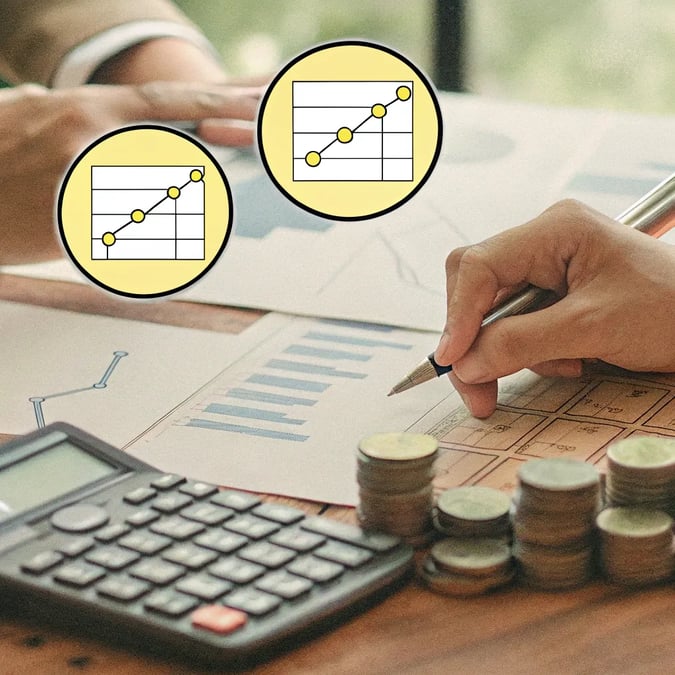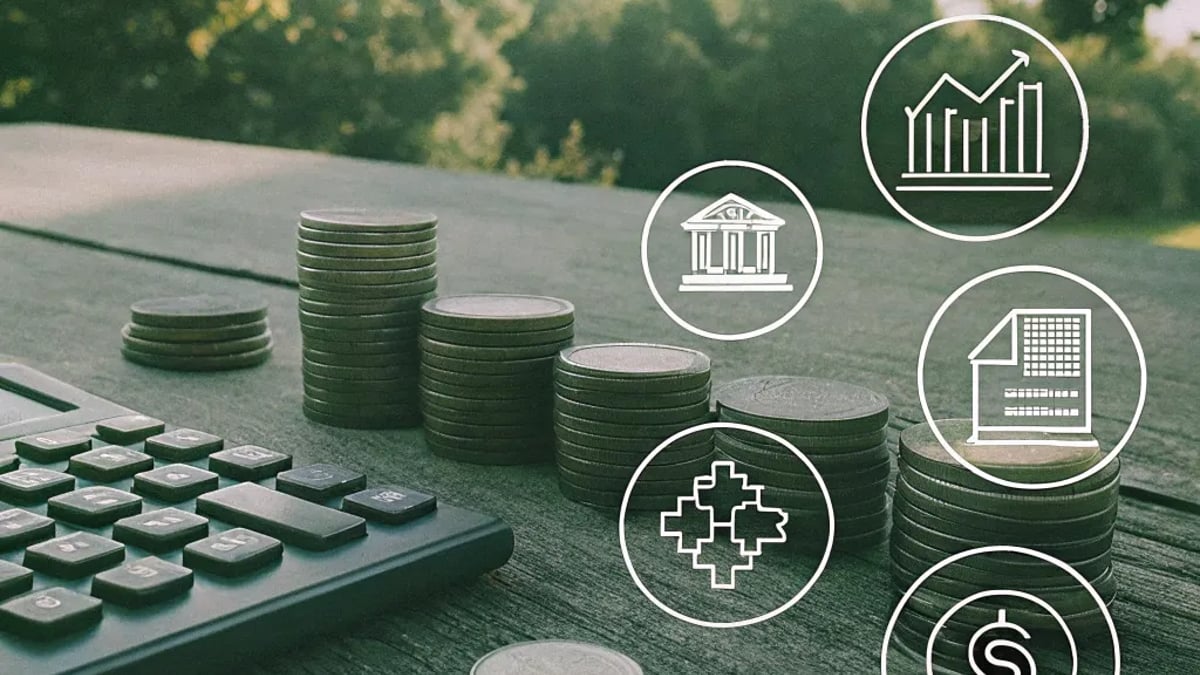
The financial landscape is shifting rapidly as we move deeper into 2025, bringing both new challenges and innovative solutions for personal money management. With inflation concerns still lingering and economic uncertainties shaping our financial decisions, mastering the art of budgeting has never been more crucial. Today's budgeting isn't just about tracking expenses in a spreadsheet—it's evolved into a sophisticated practice powered by AI, automation, and behavioral economics.
Disclaimer: This article is for informational purposes only and does not constitute financial advice. Everyone's financial situation is unique, and you should consult with a qualified financial advisor before making significant financial decisions.
The Evolution of Budgeting Tools in 2025
Remember when budgeting meant manually recording expenses in notebooks or basic spreadsheets? Those days feel increasingly distant as we navigate 2025's digital financial ecosystem. The budgeting tools landscape has transformed dramatically, with several key developments defining this year's options.
AI-Powered Financial Assistants

Perhaps the most significant shift in budgeting technology has been the mainstream adoption of AI financial assistants. These aren't just passive tracking tools anymore—they've become proactive financial partners.
Apps like Cleo, Mint's successor platforms, and the newly launched NerdWallet AI Advisor analyze your spending patterns and make surprisingly nuanced recommendations. What sets 2025's tools apart is their ability to understand context. For instance, they can distinguish between a one-time emergency expense and a developing spending problem, adjusting their guidance accordingly.
According to a recent interview on NerdWallet's Smart Money Podcast, these AI assistants now incorporate behavioral economics principles to help users overcome psychological barriers to saving. They might suggest "money dates" with yourself or partners, or implement strategic friction for impulse purchases in categories where you typically overspend.
Open Banking Integration
The full implementation of open banking standards has revolutionized how budgeting apps access and utilize your financial data. Rather than simple read-only connections to your accounts, today's budgeting platforms can:
- Aggregate data across financial institutions seamlessly
- Provide real-time spending updates and balance alerts
- Automate transfers between accounts based on spending patterns
- Negotiate better rates on your behalf for recurring bills

LexisNexis recently highlighted how even legal departments are adopting similar cloud-based financial management solutions with "smart financial management tools" that improve accuracy and efficiency—a trend that's paralleled in personal finance.
Subscription Management Features
With the average American now juggling 12+ subscription services, dedicated subscription management has become a standard feature in 2025's budgeting tools. These features go beyond simple tracking to include:
- AI-powered analysis of subscription value based on your usage patterns
- Automated negotiation bots that contact service providers for better rates
- Subscription rotation recommendations to maximize value
- Bundle opportunity identification to reduce overall costs
The subscription economy shows no signs of slowing, making these features increasingly valuable for maintaining budget control.
Current Budgeting Trends Shaping 2025

Financial behaviors and priorities continue to evolve, influenced by economic conditions and shifting values. Several distinct trends have emerged in how people approach budgeting this year.
Value-Based Budgeting
Traditional budgeting categories (housing, transportation, food) are being supplemented or replaced by value-based budgeting frameworks. This approach aligns spending with personal values and long-term goals rather than arbitrary category limits.
For example, instead of simply budgeting a generic "entertainment" category, people are creating more meaningful categories like "experiences with family" or "personal growth activities." This shift helps maintain motivation by connecting daily financial decisions to deeper purposes.
The approach isn't entirely new, but what's changed in 2025 is how budgeting tools now support this framework with dedicated features for defining and tracking value-aligned spending.
Collaborative Household Budgeting
The rise of collaborative budgeting platforms reflects changing household dynamics. These tools accommodate various financial arrangements—from traditional joint finances to partially combined systems where partners maintain some financial independence.
Features like split transaction categorization, individual spending allowances within joint budgets, and transparent bill-sharing have become standard. Some platforms even offer mediation tools for financial disagreements, acknowledging that money conflicts remain a leading source of relationship stress.
Micro-Saving and Round-Up Automation
While not new concepts, micro-saving and round-up features have evolved significantly. Today's tools go beyond basic round-ups to offer:
- Variable round-up amounts based on spending category
- Smart timing that adjusts saving amounts based on upcoming bills
- Goal-specific round-ups (vacation fund vs. emergency savings)
- Round-up multipliers during promotion periods or bonus opportunities
These subtle approaches to saving have proven particularly effective for those who struggle with traditional budgeting discipline, as they operate in the background without requiring constant attention.
Smart Budgeting Tips for 2025's Economic Reality
Understanding the tools and trends is just the beginning. Let's explore practical strategies for effective budgeting in today's economic climate.
Implement the 50/30/20 Framework—With a Twist
The classic 50/30/20 budget (50% needs, 30% wants, 20% savings) remains useful, but 2025's economic realities demand some adjustments:
- Consider a modified 55/25/20 approach if you live in a high-cost area
- Create a separate category for healthcare costs, which continue to outpace inflation
- Incorporate a "future-proofing" subcategory within your savings allocation for reskilling and education
This framework provides structure while acknowledging that some traditional percentages may need adjustment based on regional cost variations and evolving expense categories.
Automate Strategically, Review Regularly
Automation remains a budgeting superpower, but the most successful budgeters in 2025 are strategic about what they automate and what they manually review.
Nimesh Singh, in his LinkedIn article "Top Financial Tips for 2025," recommends: "Use digital budgeting tools and automated savings, but maintain monthly manual reviews of your automated systems." This hybrid approach ensures you benefit from automation while still maintaining awareness and control.
Consider:
- Automating all bill payments and scheduled transfers to savings
- Setting up automated alerts for unusual spending patterns
- Manually reviewing subscription renewals before they process
- Scheduling quarterly "financial check-ins" to review and adjust automated systems
Practice Intentional Spending Pauses
The "24-hour rule" for purchases has evolved into more sophisticated intentional spending pauses. With one-click purchasing and embedded payment options everywhere, creating strategic friction in your spending process can prevent budget derailment.
Effective approaches include:
- Setting different waiting periods based on purchase amount (24 hours for $100+, 72 hours for $500+)
- Using dedicated "shopping list" apps that track desired items but intentionally don't connect to payment methods
- Implementing "money-free weekends" once monthly to reset spending patterns
- Practicing "replacement before addition" for discretionary categories
Budget for Climate Resilience
A newer budgeting consideration for 2025 is planning for climate-related financial impacts. This might include:
- Creating a dedicated emergency fund for extreme weather events
- Budgeting for home resilience improvements
- Accounting for potentially higher food costs during supply chain disruptions
- Planning for increasing energy costs or investments in energy independence
This approach acknowledges that climate considerations are becoming a financial reality rather than just an environmental concern.
How Can I Create a Realistic Budget That I'll Actually Stick To?
This question plagues many budgeters, and the answer has evolved significantly in 2025. Creating a sustainable budget involves both technical and psychological elements:
- Start with spending analysis, not arbitrary limits. Track your actual spending for 30-60 days before setting category limits. Many budgets fail because they're based on wishful thinking rather than reality.
- Build in flexibility with a "roll-over" approach. Rather than starting each month from zero, allow unused category amounts to roll over, creating motivation to spend less rather than rushing to "use up" budgeted amounts.
- Incorporate "planned splurges". The most sustainable budgets include occasional planned indulgences. Research shows that completely eliminating small pleasures often leads to larger budget-breaking behaviors later.
- Use visual progress tracking. Our brains respond strongly to visual cues of progress. Modern budgeting apps offer customizable visual trackers that can significantly improve adherence.
- Practice values-based categorization. Instead of generic categories, name them according to your values and goals: "Building Home Security" sounds more motivating than "Emergency Fund."
According to the NerdWallet Smart Money Podcast, "The most successful budgeters in 2025 aren't necessarily those with the most sophisticated tools, but those who've aligned their budgeting system with their psychological tendencies and personal values."
Specialized Budgeting Approaches for Different Life Stages
Young Professionals: The Career Investment Budget
For those early in their careers, 2025's budgeting best practices emphasize strategic investment in career development alongside traditional financial goals:
- Allocating 3-5% of income to professional development and networking
- Building an "opportunity fund" separate from emergency savings to enable career pivots or relocation
- Implementing aggressive debt reduction strategies for student loans while building starter retirement contributions
- Using "skills-based" budgeting that aligns spending with developing marketable capabilities
Young professionals face unique challenges in 2025's job market, making this career-focused budgeting approach particularly valuable for long-term financial health.
Mid-Career: The Balance-Seeking Budget
Those in mid-career often juggle competing financial priorities—from saving for children's education to caring for aging parents while preparing for their own retirement. Effective budgeting for this group includes:
- Creating separate savings vehicles with different time horizons and risk profiles
- Implementing "priority rotation" where different financial goals receive focused attention in different quarters
- Using scenario planning tools to evaluate trade-offs between competing goals
- Incorporating healthcare planning as a distinct budget category
The complexity of mid-career financial demands makes sophisticated budgeting tools particularly valuable for this life stage.
Pre-Retirement: The Transition Budget
For those approaching retirement, 2025's budgeting approaches focus on testing and preparing for the transition from earning to spending saved assets:
- "Retirement rehearsal" budgeting that simulates living on projected retirement income
- Detailed healthcare cost projections including supplemental insurance needs
- Creating separate buckets for different phases of retirement (active early retirement vs. later years)
- Tax-optimized withdrawal planning across different account types
As noted during the "Current Trends in Nebraska Land Values" presentation from Ag Smart Money Week, even specialized assets like agricultural land require careful budgeting and planning for the 2025 transition year.
The Future of Budgeting: What's Next?
As we look beyond 2025, several emerging trends suggest where budgeting might be headed:
Integrated Financial Ecosystems
The lines between budgeting, investing, banking, and financial planning continue to blur. Future platforms will likely offer seamless integration across these functions, with unified dashboards providing comprehensive financial management.
Predictive Financial Planning
While today's tools offer basic forecasting, next-generation budgeting systems will likely incorporate more sophisticated predictive capabilities, including:
- AI-generated life event predictions and their financial implications
- Personalized economic impact assessments based on your specific financial profile
- Automatic budget adjustments based on predicted future events
Community-Based Financial Wellness
Some innovative platforms are already exploring community aspects of budgeting, where anonymized data sharing and group accountability improve outcomes. This trend will likely expand with features like:
- Opt-in spending comparisons with similar demographic groups
- Community challenges for saving goals
- Collective negotiating power for common services
These developments suggest budgeting will continue evolving from a solo tracking exercise to a more dynamic, integrated, and communal practice.
Conclusion: Budgeting as a Living Practice
Budgeting in 2025 has transcended its traditional role as a restrictive financial tool to become a dynamic practice that balances structure with flexibility, technology with human psychology, and immediate needs with long-term aspirations.
The most successful approach combines the sophisticated tools now available with timeless principles of intentionality and alignment with personal values. Whether you're using cutting-edge AI advisors or a modified version of traditional methods, the key is creating a system that works with your life rather than against it.
As we navigate the remainder of 2025 and beyond, remember that budgeting isn't about perfection—it's about progress toward the financial future you envision. The best budget is ultimately the one you'll actually use.
What budgeting tools or techniques have you found most helpful in 2025? Share your experiences in the comments below.
Tags

About Evan L. Chamberlain the Author
Evan L. Chamberlain is a seasoned personal-finance strategist with over 15 years of experience in helping individuals maximize their savings and efficiently manage debt. His approachable insights on budgeting and investment have empowered thousands to take control of their financial futures.
Recommended Articles
2026’s Most Talked-About Glasses for Women Over 60
Discover the latest eyewear trends for women over 60 in 2026, featuring bold frames, vibrant colors, and health-conscious designs.
The 2026 Senior Walking Aids Experts Recommend for Safety and Comfort
Explore expert-recommended walking aids for seniors in 2026, ensuring safety and comfort while enhancing mobility and independence.
How Rent-to-Own Homes Can Help You Build Equity Faster
Discover how rent-to-own homes enable faster equity building, providing a unique pathway to homeownership without immediate purchasing pressure.
Mortgage Relief Grants You May Qualify for in 2026
Explore available mortgage relief grants for 2026. Find out how to qualify for financial support to ease your home-related challenges.
Grants That Help Single Moms Buy Homes in 2026
Discover grants for single moms to buy homes in 2026. Learn about essential programs designed to ease the journey to homeownership.




